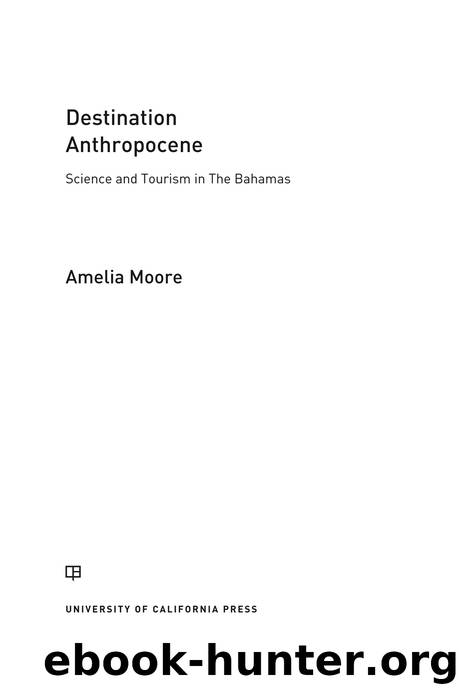Destination Anthropocene : Science and Tourism in the Bahamas (9780520970885) by Moore Amelia

Author:Moore, Amelia
Language: eng
Format: epub
ISBN: 9780520298927
Publisher: Univ of California Pr
THE SOCIAL SCIENCE OF FISHING AND FISHERIES
When people in The Bahamas hear that I, an American academic, have spent time talking to fishers, their first response is to commend my work; they assume I am working to conserve marine resources by teaching fishers to recognize the threat they pose to the marine environment. They assume that people who make a living extracting natural resources will take anything and everything they can to make money, unless they possess crucial knowledge about scarcity. Another common assumption is that the marine management community needs to learn more about fishing activities to understand the extent of fishing impacts on the marine environment to make appropriate interventionist policy. My work is appreciated only if it can educate both managers and fishers about anthropogenic change. I have become an intermediary.
This middle-ground positioning is common in the fields of maritime and fisheries anthropology. Maritime anthropology has historically been associated with investigations of the lives of people who live by and off of the sea, and I discuss it here to show how the field has shaped understandings of fisheries in general so that we might follow those understandings as they evolve in the Anthropocene. Much of the work done in this vein has been concerned with collecting fisher narratives and classifying fishing economies and forms of social adaptation and organization around fishing practices.8 This field exemplifies the way that the sciences of conservation and management and the social sciences are becoming increasingly interconnected within Anthropocene science.9
Fishing is of course a central concept for most maritime anthropologists, described as a productive activity that depends more on natural or wild processes than manufactured processes.10 Fishing is therefore sometimes construed as closer to nature in this analytic tradition. Maritime anthropologists are âexplicitly or implicitly concerned with what there is about a wet and fishy productive regime that defines the social, cultural, and economic life of fishing communities.â11
As is evidenced by the DMRâs management strategy to overfish the invasive, the lionfish and Bahamian fishers exist in an institutional world wherein nature is in crisis and their existence as appropriate parts of that nature is now in question. This framing legitimates efforts to manage people who fish, reflecting prevailing trends in marine social science. Maritime anthropology has therefore become most widely relevant as a tool for social impact analysis. As a form of applied anthropology, social impact analysis assesses the impacts of policy changes and major events on communities, groups, families, and individuals and is often mandated by law as an aspect of management projects involving drastic social change and intervention.12 Anthropologists and other social scientists are increasingly called to complete these assessments, with this sort of collaboration becoming a matter of course. If âanthropologising on fishermen has become quite an industry,â then maritime anthropology has increasingly become a form of policy-oriented anthropology.13 It has become an example of a âsupport scienceâ: a social science that bolsters the designs of the natural sciences and helps to produce the socioecologics of the Anthropocene in ways that contribute to a certain style of management.
Download
This site does not store any files on its server. We only index and link to content provided by other sites. Please contact the content providers to delete copyright contents if any and email us, we'll remove relevant links or contents immediately.
The Lonely City by Olivia Laing(4120)
Animal Frequency by Melissa Alvarez(3755)
All Creatures Great and Small by James Herriot(3516)
Walking by Henry David Thoreau(3234)
Exit West by Mohsin Hamid(3183)
Origin Story: A Big History of Everything by David Christian(3139)
COSMOS by Carl Sagan(2950)
How to Read Water: Clues and Patterns from Puddles to the Sea (Natural Navigation) by Tristan Gooley(2855)
Hedgerow by John Wright(2776)
The Inner Life of Animals by Peter Wohlleben(2766)
Origin Story by David Christian(2683)
How to Read Nature by Tristan Gooley(2665)
Project Animal Farm: An Accidental Journey into the Secret World of Farming and the Truth About Our Food by Sonia Faruqi(2661)
How to Do Nothing by Jenny Odell(2645)
A Forest Journey by John Perlin(2587)
Water by Ian Miller(2584)
The Plant Messiah by Carlos Magdalena(2453)
A Wilder Time by William E. Glassley(2363)
Forests: A Very Short Introduction by Jaboury Ghazoul(2335)
